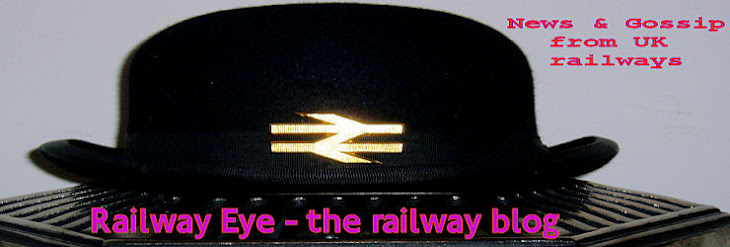Telegrammed by our Independent Expert
A First Great Western HST broke speed record from Plymouth yesterday afternoon with record time of 2 hr 43 minutes.
Not bad for a 35-year-old dowager.
FGW will be hoping that Messrs Osborne and Cable have noted in advance of next week's spending review...
UPDATE: This from Captain Deltic...
Not sure that a dowager would strip down to five cars and go like smoke.
Perhaps we should refer to 'train of a certain age'.
Certainly IC125 is more Anne Bancroft than Margaret Rutherford.
Here's to you Mrs Robinson
UPDATE: This from The Skip...
84139 PLYMOUTH 12:50 12:49A 1 EARLY
73000 PADDINGTN 15:31 15:33A 2 LATE
Sadly booked for 2h41, did it in 2h44, saeth TRUST!
UPDATE: This from a Mr Tony Miles...
TRUST is a rounder-up of figures..
I was at the table in front of official timer John Heaton - he is rather more accurate than TRUST!
(and I was wearing a radio controlled watch - as supplied to many TOCs)
By my watch:
Train departed Plymouth at 12:49 & 55 seconds
Came to a halt at Paddington at 15:33 & 18 seconds
So - 2h 43m 23 seconds
TRUST lies - Mr Heaton told FGW "2:43 and a few seconds, I'm just checking the stopwatch" at which point FGW announced "2:43", so TRUST should probably say 2:43.
AND as a couple of bits of rather poor regulation cost 3.5 minutes - according to Mr Heaton - the official time could have been under 2:40 if only those errant signallers had done as well as the rest of their colleagues along the route!
I no longer trust TRUST...
UPDATE: This from a Mr Bruce, who claims he knows what he is talking about...
Why does Mr Miles no longer trust TRUST?
The results are exactly as expected. TRUST works in hh:mm and truncates the seconds.
"Train departed Plymouth at 12:49 & 55 seconds" will be captured by SMART to the second and stored in TRUST as 12:49 - 1m early.
"Came to a halt at Paddington at 15:33 & 18 seconds" will also be captured by SMART to the second and stored in TRUST as 15:33 - 2m late.
Now you may say that we should be working to seconds in TRUST - but aside from the cost of altering the software, what is the point when the contractually timetable is published to the nearest half-minute?
And what does departure mean if you start working to the nearest second? When the doors close? When the wheels turn? When the platform is vacant for its next use?
UPDATE: This from The Sleeper...
Noting Tony Miles comments on TRUST...which is older, an HST or the TRUST system?
UPDATE: This from the aforementioned Mr Bruce...
And in answer to the question, "which is older, an HST or the TRUST system?", it must be the HST because TRUST started its implementation in 1985, if I remember correctly, just a year before I started work on it. This was on the LMR, plugging into the LM's ATR system.
It didn't capture class 2 and 5 units across the entire network until the beginning of Railtrack days and contractual regimes.
And I have a vague recollection that it didn't do automatic data collection on the Western until early Railtrack days when it plugged into various bits of Western signalling.
UPDATE: This further update from Mr Miles...
The point I was making about TRUST is that it is irrelevant when determining a speed record... (especially when it rounds by removing the seconds in the way it does.. according to TRUST the train started moving 55 seconds before it actually did... remind me to pass that really useful information to the organisers of the 2012 Olympics - it will make the race timings so much easier...)
100m - 1 minute
200m - 1 minute
400m - 1 minute
800m - 2 minutes
1500m - 4 minutes
Need I go on?
UPDATE: It would appear so. More from Mr Miles...
And might I just add that for the purposes of setting a time record it is from the moment the train starts to move until the moment it stops... (As has this thread. Ed)
Hulleys’ Closure - My Thoughts
9 months ago





